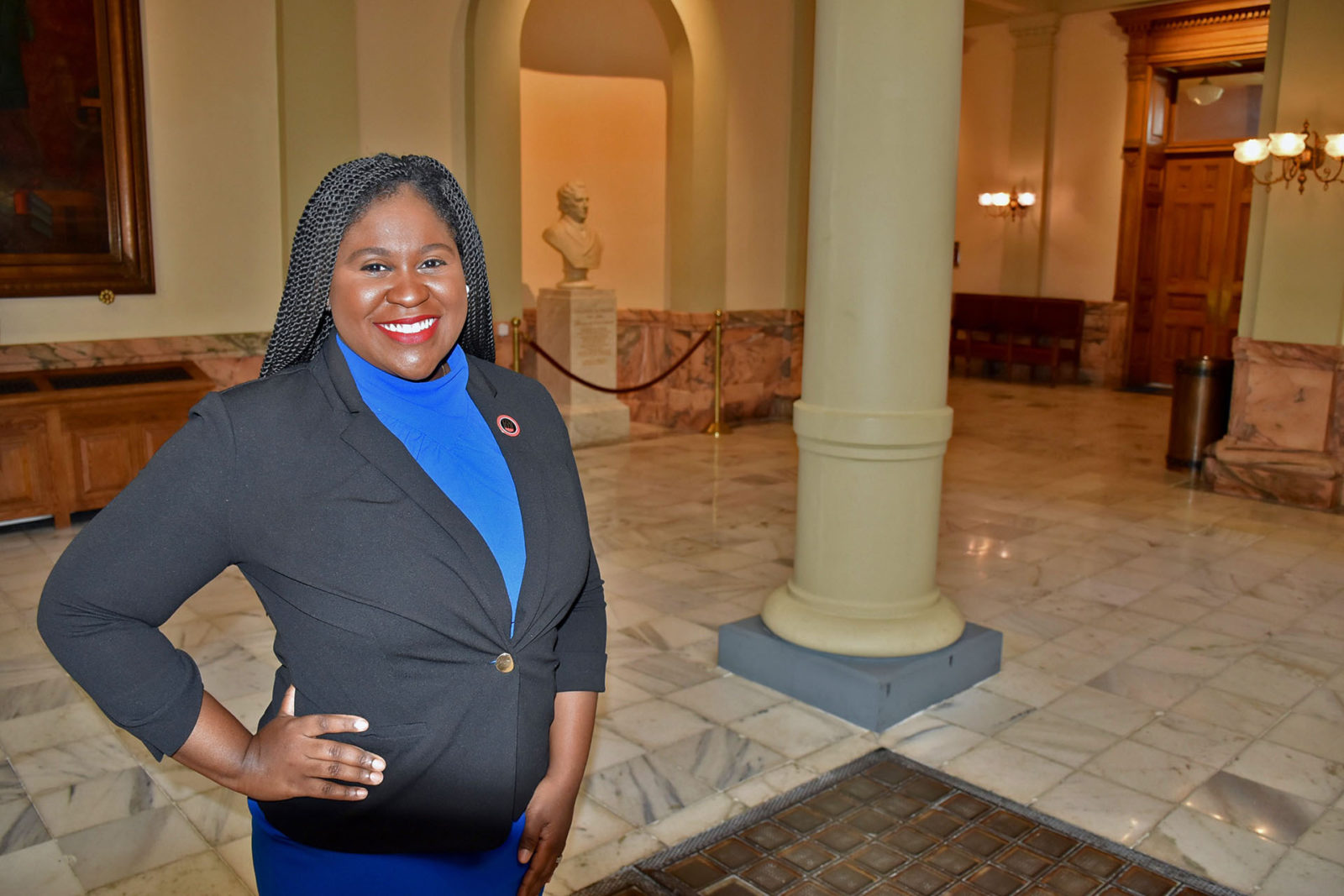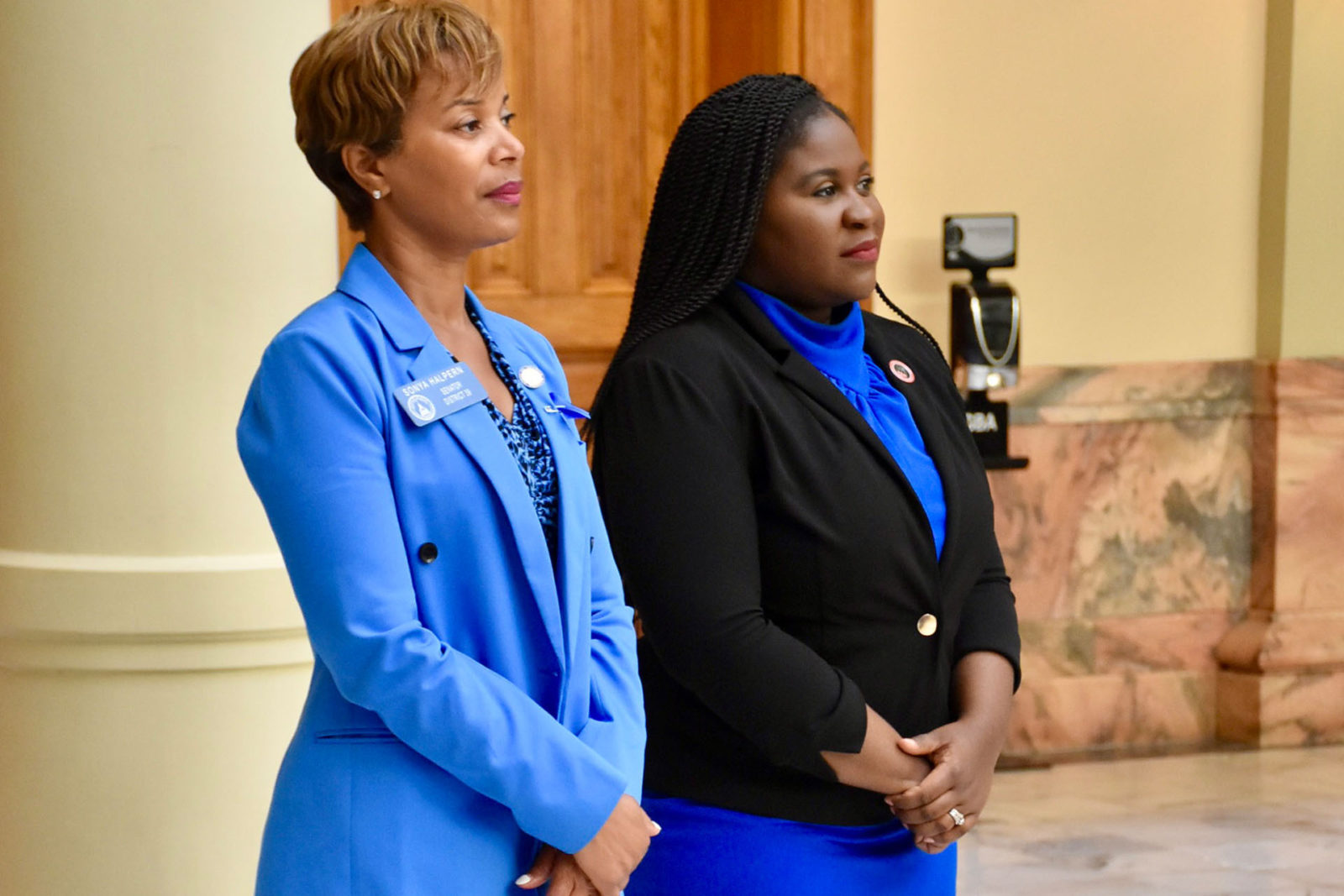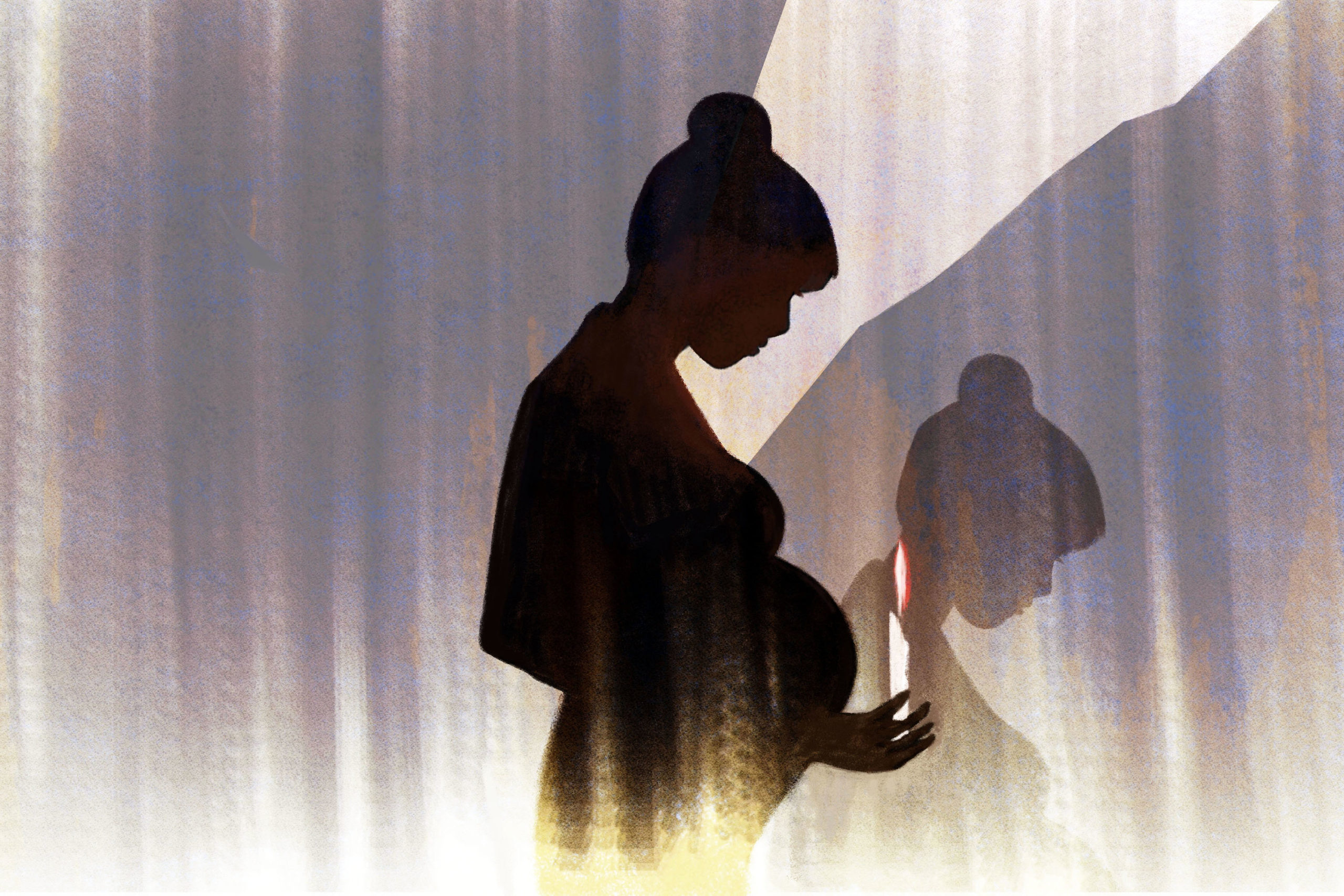The last thing Tomeka Walker remembers that day was making pasta salad for a Memorial Day cookout. Despite the Birmingham humidity hanging heavy, her family was excited to celebrate a milestone: Walker was halfway through her first pregnancy.
But while getting ready for the party at her parents’ home, where she lived at the time, she started having what felt like period cramps. She later found out they were contractions. Within the hour, she gave birth to her son — who she’d already named Khairi — in her childhood bedroom. He was just over 21 weeks old and died shortly afterward at the hospital.
That was eight years ago, but Walker is still reeling from the trauma. “Some days I’m still just no good,” she said.
Despite the mental anguish she faced, Walker had few if any options after her son’s death to seek mental health care. That lack of care remains to this day, and is only getting worse. Experts say that resources are most absent in states where the need is the highest — and especially among Black mothers.
The Deep South has the fewest mental health providers per capita. Walker’s state, Alabama, is least prepared for the demand with 121 providers per 100,000 people, compared to the national average of 284. When looking for Black female therapists who can offer culturally competent care to other Black folks — something experts say helps decrease stigma and improves therapy outcomes — the pool narrows even more. Only 4 percent of the US psychology workforce is Black.
Meanwhile, Black mothers are twice as likely to have postpartum depression, but half as likely to get care for it compared to white folks, according to research from the American Medical Association. Postpartum depression is more common in Alabama and Mississippi than anywhere else in the country — where an average of 1 in 4 postpartum people report symptoms.
“Postpartum depression is just so common,” said Sinsi Hernández-Cancio, vice president for health justice at the National Partnership for Women and Families. “I also think that many of us come into pregnancy depressed, but there’s a lot of preexisting conditions, because of all the trauma that many of us have gone through, including adverse childhood events, which is also very linked and more predominant amongst people of color.”
A major source of mental health strain for Black women is the physical threat they and their babies face during and after pregnancy. Black women are more than twice as likely to experience pregnancy loss or die themselves because of pregnancy, according to the Centers for Disease Control and Prevention. And Black babies are twice as likely to die before their first birthday than white ones.
“It’s important to understand the effects of toxic stress and trauma and intergenerational trauma, and there’s every day more and more information developed around the incredible stress that people are in daily — not because of their race, but because of racism,” Hernández-Cancio said.
One the most well-documented manifestations of this racism is doctors not listening to their Black patients.
In Walker’s case, there were nearly a dozen opportunities for health providers to intervene, but one after another brushed her off, she says. About 20 weeks into her pregnancy, she started to feel like something was really wrong — she wasn’t feeling kicks like she did before. But providers dismissed her concerns. One doctor told her she was overreacting to period spotting. Another said she was exaggerating the pain. Yet another told her to “drink a Coke” to get the baby moving.
“None of them cared or sat and took the time to have conversations about what was going on with me. They were just on a mission to come in, get my info, write it down, and go on with their day,” she said.
When the worst outcome imaginable actually happened — the loss of her son — her sadness from the preventable preterm birth spiraled. She had nowhere to turn for help because there were no providers in her area who understood the intersection of her grief and her hormonal response to a suddenly-terminated pregnancy.
“I needed someone to talk to when my family didn’t understand, but the support group I found only met once a month and when I got back home, everything was the same,” Walker said. “It felt like just wasting an hour to feel good for an hour.”
Georgia and Alabama, where Walker lives, are the most dangerous places in the country to give birth. And for deaths during the perinatal period, which is the time during and after pregnancy, there are stark race disparities.
Black perinatal health advocates have long made the connection between these mortality rates, racism in healthcare, and the perinatal mental health crisis for Black birthing people.
The disparities, they say, are not biological nor fully dependent on social inequities. While Black folks are more likely to be under-insured and underpaid compared to white people, neither level of education nor insurance coverage or higher incomes protect Black women from the risk of death.
“Black women cannot educate or earn their way out of the crisis,” Hernández-Cancio said.
“We talk about the health system and we talk about economics, but underneath all those inequities is racism — it’s not a separate factor. All of these inequities in the socio-economic space and in the healthcare space are underpinned by the historic and ongoing practices and structures of the hierarchy of human value based on race.”
Shontel Cargill, a perinatal therapist and president of the Georgia chapter of Postpartum Support International, said giving birth in the South takes a mental health toll on Black folks. The statistics alone on increased maternal mortality and miscarriages increase stress levels, which are already heightened during pregnancy and can cause further complications, she says.

Cargill and other perinatal mental health providers say systemic racism in healthcare is the biggest barrier in overcoming maternal mortality and mental health care disparities. Nearly 1 in 3 Black women report being actively mistreated by hospital staff during childbirth. For Black birthing folks, it’s a bombardment of stressors, such as being ignored by providers and navigating insurance barriers, that compound over time and pose their own health risks. And those siloed health services leave patients without care, Cargill says, even among those with insurance and who know how to navigate the system.
Cargill says there’s a need to bridge the gap in services between perinatal health and mental health. “Mental health and physical health we know are interconnected. We know they play off of each other. But there’s still a tremendous gap because they stay in their silos,” she said.
Cargill came to Postpartum Support International as a patient and a provider. She credits the organization with saving her life. She calls herself a “mom of an angel, survivor, advocate” first, and a therapist second.
“I just see the need [for more mental health support] because I’ve been there. I’ve experienced the trauma.” she said. “I want to be that person. I don’t care if it reaches one mom, I don’t care if it’s two of them. I want to see change in the state.”
***
Though federal policy requires insurers to cover both perinatal health and mental health services as part of “essential health benefits,” states have wide-reaching control over the logistics. These benefits also only work if someone has insurance. In the Deep South — the only region in the country where nearly every state has refused to expand the Medicaid program that provides health insurance for low-income people — federally guaranteed rights don’t go far.
Despite the barriers, some progress is being made to address the dual maternal and mental health crises in the Deep South, mainly thanks to the work from women of color on the ground, like Cargill and Walker.
This year, Georgia passed a mental health parity law, which mandates local insurers cover mental health treatment at the same rates as routine physical treatment. That means state plans, including Medicaid, have to cover mental health prevention and treatments, such as anxiety or depression medications, the same way they cover a broken arm. Georgia also recently extended postpartum Medicaid health insurance to a year after pregnancy. Both of those policies were enacted federally in 2010, but without state buy-in until now after a decade of bi-partisan legislative compromises, the benefits were out of reach for Georgians.

Alabama, after years of lobbying by local health advocates, just extended postpartum Medicaid benefits, so people don’t lose their insurance 60 days after birth. Mississippi, however, has failed two years in a row to leverage rare bi-partisan support to pass a maternal Medicaid extension. So Mississippians — with the highest infant mortality in the country and one of the highest rates of maternal mortality — continue to lose Medicaid health insurance two months after they give birth. The state is now the only one in the South not to have some version of postpartum Medicaid extension in the works.
Because Medicaid covers 3 in 4 births in the state, the vast majority of postpartum Mississippians lose their health insurance just after giving birth. This is the same period when the state sees the most perinatal deaths. Most Mississippi maternal mortality happens postpartum — 86 percent — with almost half of those deaths happening after six weeks, just as their health insurance cuts off. Mental health and trauma are wrapped up in many of the state’s maternal deaths, according to the state’s Maternal Mortality Review Committee. At least 11 percent of all Mississippi maternal deaths are by overdose or suicide.
Not only do states need more providers, those providers need to be trained in culturally competent care that crosses specialties, perinatal mental health providers say.
Obstetricians need more mental health training and therapists need to understand mental and physical complications specific to the perinatal period — and not just postpartum depression, which gets the lion’s share of perinatal mental health attention, Cargill says. There is a range of complications that can be pre-existing and exacerbated by pregnancy, or arise for the first time during the perinatal period, known as Perinatal Mood and Anxiety Disorders.
“I can sit with others who may experience it as well. Not as a provider, but as a person who’s experienced it. And who looks like them,” she said. “Some of those conversations we don’t have with each other, just simply because there’s just so much stigma historically around mental health.”
***
In coping with the loss of her son, Walker found little support. Friends and family couldn’t relate and the few grief support groups she found didn’t understand the impact of infant loss. On top of the grief and separate — but related — growing postpartum depression, Khairi’s burial costs were swelling.
“It was the emptiest feeling ever to leave the hospital without him,” she said. “And we had to go straight to the funeral home.” The cost of a funeral for Khairi was about $5,000.
That’s why in October 2014, just a few months after losing her son, she started the Khairi and Little Angels’ Memorial fund to help Birmingham families pay for a sudden infant death and to cope with the loss. Walker raised $20,000 from her community last year.
“I’m trying to eliminate barriers to get folks into care,” she said. “I know what it’s like to not be able to pay the bill but still need help.”
Eight years after her loss, Walker has made inroads across Birmingham — connecting providers, the health department, and folks in the community to get resources into the hands of families that need it.
“We have to meet families where they are, but help move them forward too,” she said. “I want to be that person that they can turn to if they find themselves in this position because I know the type of shoes she’s wearing right now.”
***
Editor’s note: This story includes several references to maternal mortality, a term that is standard and common in data collection and reporting. When not referring specifically to data, we use language to include all birthing people.
Visit PSI GA and Khairi’s and Little Angels’ Memorial for perinatal mental health resources in Georgia and Alabama, or get free, confidential support through the 24/7 National Maternal Mental Health Hotline: Call or text 1-833-9-HELP4MOMS (1-833-943-5746)




